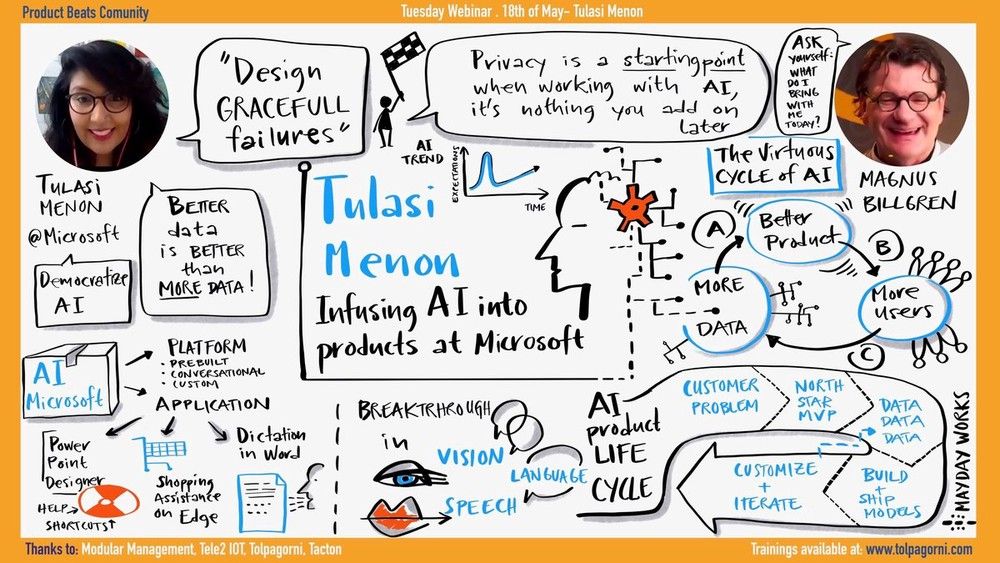Episode 58: Infusing AI into products at Microsoft w/Tulasi Menon
18 May, 2021 / Host: Magnus Billgren
Pragmatic Process and Principles for Incorporating AI Solutions
In the ever-evolving tech landscape, artificial intelligence (AI) has become a prominent force driving innovation and transforming industries. Companies like Microsoft are at the forefront of harnessing the power of AI to enhance their products and platforms. In a recent episode of The Productbeats Show, Tulasi Menon, an expert in integrating AI into products, shared her experiences and principles for building AI solutions. This article delves into the key takeaways from her interview, providing valuable insights for product managers and highlighting the significance of AI in product development.
The Role of AI in Microsoft's Product Strategy
Tulasi Menon emphasized the importance of infusing AI into Microsoft's products and platforms, including Azure, Outlook, and Microsoft Edge. She stressed that AI is not the problem itself but rather a potential solution to various challenges. By strategically integrating AI, Microsoft aims to reposition its products and provide users with enhanced experiences.
The Pragmatic Process of Integrating AI
Tulasi shared her pragmatic approach to integrating AI into product development. She emphasized the need for a minimum viable product (MVP) that incorporates limited AI solutions. This approach ensures that product teams don't get stuck in the development phase and enables them to gather feedback and iterate quickly. Failure, according to Tulasi, should be embraced as an opportunity to learn and improve gracefully.
Real-World Examples of AI Integration
Tulasi highlighted several examples of how Microsoft leverages AI in its applications. One example is the integration of AI in PowerPoint to automatically identify and categorize image content, making the design process more efficient. Another example is the use of AI in Microsoft's shopping services, helping users find better prices, compare products, and apply coupons to maximize savings. These examples demonstrate the power of AI in improving user experiences and delivering personalized solutions.
The Rise of AI and its Importance for Product Managers
Tulasi addressed the question of why AI has gained such prominence in recent years and why product managers should care about it. She explained that advancements in data availability, computing power, and complex models have enabled the realization of human-level understanding and intelligence. As AI continues to evolve, it presents exciting opportunities for product managers to create more personalized and innovative products.
Trends and Considerations in AI Integration
Tulasi discussed current trends and considerations in the AI space. She highlighted the importance of privacy-preserving models and cautioned against viewing AI as a one-size-fits-all solution. Product managers should maintain a narrow focus and be mindful of ethical considerations when incorporating AI into their products. Tulasi emphasized the need for responsible AI practices and transparency in data usage to build user trust.
The AI Product Life Cycle: A Workflow for Product Managers
Drawing from her experience, Tulasi outlined a simplified AI product life cycle for product managers. She emphasized the importance of starting with the customer problem rather than focusing solely on the technology. The workflow includes defining goals, evaluating models, leveraging existing AI platforms, customization, and continuous improvement through data iteration. Product managers play a crucial role in ensuring privacy, addressing biases, and designing deterministic and predictable user experiences.
Takeaways
- Start with the customer problem: Tulasi Menon emphasizes the importance of identifying customer pain points and using them as a foundation for integrating AI into products. By understanding the specific challenges users face, product teams can design AI solutions that truly address their needs.
- Use an MVP approach: Menon suggests adopting a Minimum Viable Product (MVP) approach when incorporating AI into products. This allows for iterative development and quick feedback loops, enabling teams to validate their AI solutions with real users and make necessary adjustments along the way.
- Design thoughtful experiences: Integrating AI into products requires careful consideration of user experience. Menon highlights the significance of creating seamless and intuitive interactions that leverage the strengths and limitations of AI. By designing experiences that are mindful of AI's capabilities, product teams can deliver personalized and valuable solutions to their customers.
Speaking of product management excellence, one way to enhance your skills and knowledge in this field is by enrolling in The Productbeats Product Management Certification Program. This comprehensive program is designed to equip aspiring and seasoned product managers with the necessary tools and expertise to excel in their roles. Whether you're looking to deepen your understanding of product strategy, sharpen your analytical skills, or master the art of stakeholder management, this certification program offers a structured curriculum taught by industry experts. With hands-on projects, real-world case studies, and networking opportunities, The Productbeats Product Management Certification Program can be your stepping stone towards becoming a highly skilled and sought-after product manager.
You might also enjoy watching...
Copyright © 2023 ProductBeats AB

Get The Program Brochure
Submit the form below to have The Program Brochure delivered to your inbox
The title of the notification
The descriptive text of the notification


